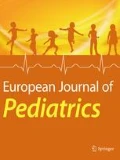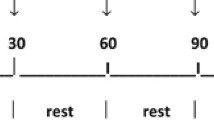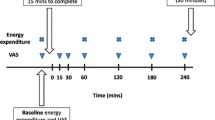Abstract
Resting metabolic rate (RMR) and the thermic effect of a meal (TEM) were measured in a group of 26 prepubertal children divided into three groups: (1) children with both parents obese (n=8, group OB2); (2) children with no obese parents and without familial history of obesity (n=8, OB0); and (3) normal body weight children (n=10, C). Average RMR was similar in OB2 and OB0 children (4785±274 kJ/day vs 5091±543 kJ/day), but higher (P<0.05) than in controls (4519±322 kJ/day). Adjusted for fat-free mass (FFM) mean RMRs were comparable in the three groups of children (4891±451 kJ/day vs 5031±451 kJ/day vs 4686±451 kJ/day in OB2, OB0, and C, respectively). The thermic response to the mixed meal was similar in OB2, OB0 and C groups. The TEM calculated as the percentage of RMR was lower (P<0.05) in obese than in control children: 10.2%±3.1% vs 10.9%±4.3% vs 14.0%±4.3% in OB2, OB0, and C, respectively. The similar RMR as absolute value as well as adjusted for FFM, and the comparable thermic effect of food in the obese children with or without familial history of obesity, failed to support the view that family history of obesity can greatly influence the RMR and the TEM of the obese child with obese parents.
Similar content being viewed by others
Abbreviations
- FFM:
-
fat-free mass
- RMR:
-
resting metabolic rate
- RQ:
-
respiratory quotient
- TEM:
-
thermic effect of meal
References
Blaza S, Garrow J (1983) Thermogenic response to temperature, exercise and food stimoli in lean and obese women studied by 24 h direct calorimetry. Br J Nutr 49:171–180
Bouchard C, Tremblay A, Nadeau A, et al (1989) Genetic effect in resting and exercise metabolic rates. Metabolism 38: 364–370
D'Alessio DA, Kavle EC, Mozzoli M, Smalley KJ, Polansky M, Kendrik ZV, Owen LR, Bushman MC, Boden G, Owen OE (1988) Thermic effect of food in lean and obese men. J Clin Invest 81:1781–1789
Felig PJ, Cunningham J, Levitt R, Hendler R, Nadel E (1983) Energy expenditure in obesity in fasting and post-prandial state. Am J Physiol 224:E45-E51
Fontaine E, Savard R, Tremblay A, et al (1985) Resting metabolic rate in monozygotic and dizygotic twins. Acta Genet Med Gemellol (Roma) 34:41–47
Hagman U, Bruce A, Persson LA, Samuelson G, Sjolin S (1986) Food habits and nutrient intake in childhood in relation to health and socioeconomic conditions. A Swedish multicenter study 1980–1981. Acta Paediatr Scand [Suppl 1] 328:56
Heindel JJ, Cushmann SW, Jeanrenaud B (1974) Cell-associated fatty acid levels and energy requiring process in mouse adipocyte. Am J Physiol 226:16–24
Herbert V, Lau KS, Gottlieb CW, Bleicher SJ (1965) Coated Charcoal immunoassay of insulin. J Clin Endocrinol Metab 25:1375–1384
James WPT, Trayhurn P (1976) An integrated view of the metabolic and genetic basis for obesity. Lancet II:770–772
Jequier E (1984) Energy expenditure in obesity. Clin Endocrinol Metab 13:563–580
Jung RT, Shetty PS, James WPT, Barrand MA, Callingham BA (1979) Reduced thermogenesis in obesity. Nature 279: 322–323
Lohman TG (1986) Applicability of body composition techniques and constants for children and youth. Exerc Sport Sci Rev 14:325–357
Lusk G (1928) The elements of the science of nutrition, 4th edn. WB Saunders, Philadelphia
National Daily Recommended Intakes of Nutrients 1986–1987. Italian Society of Human Nutrition. National Institute of Nutrition. Litho Delta, Milano
National Diabetes Data Group (1979) Classification and diagnosis of diabetes mellitus and other categories of glucose intolerance. Diabetes 28:1039–1057
Poehlman ET, Tremblay A, Fontaine E, et al (1986) Genotype dependency of the thermic effect of a meal and associated hormonal changes following short-term overfeeding. Metabolism 35:30–36
Ravussin E, Archeson KJ, Vernet O, Danforth E Jr, Jequier E (1985) Evidence that insulin resistence is responsible for the decreased thermic effect of glucose in human obesity. J Clin Invest 76:1268–1273
Ravussin E, Lillioja S, Knowler WC, Christin L, Freymond D, Abbott GH, Boyce V, Howard B, Bogardus C (1988) Reduced rate of energy expenditure as a risk factor for body weight gain. N Engl J Med 318:467–472
Richterich R, Dauwalder H (1971) Bestimmung der Plasmaglukosekonzentration mit der Hexokinase-Glucose-6-Phosphat-Dehydrogenase-Methode. Schweiz M Wochenschr 101:615–618
Schutz Y, Bessard T, Jequier E (1984) Diet-induced thermogenesis measured over a whole day in obese and nonobese women. Am J Clin Nutr 1984: 40:542–552
Sims EAH, Danforth E (1987) Expenditure and storage of energy in man. J Clin Invest 79:1019–1025
Tanner JM (1962) Growth at adolescence, 2nd edn. Blackwell, Oxford
Tanner JM, Whitehouse RH, Takaishi M (1966) Standards from birth to maturity for height, weight, height and weight velocity: British children, 1965. Arch Dis Child 41:454–495
Trayhurn P, Fuller L (1980) The development of obesity in genetically diabetic obese (db/db) mice pair-fed with lean siblings: the importance of thermoregulatory thermogenesis. Diabetologia 19:148–153
Trayhurn P, Jones RM, McGuckin MM, Goodbody AE (1982) Effects of overfeeding on energy balance and brown fat thermogenesis in obese (ob/ob) mice. Nature 295:323–325
Author information
Authors and Affiliations
Rights and permissions
About this article
Cite this article
Maffeis, C., Schutz, Y., Zoccante, L. et al. Meal-induced thermogenesis in obese children with or without familial history of obesity. Eur J Pediatr 152, 128–131 (1993). https://doi.org/10.1007/BF02072489
Received:
Accepted:
Issue Date:
DOI: https://doi.org/10.1007/BF02072489




